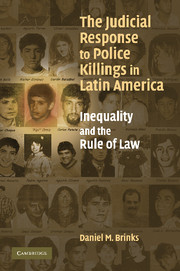Book contents
- Frontmatter
- Contents
- Preface
- 1 Effectiveness and Inequality in the Legal System
- 2 Charting Injustice in Argentina, Brazil, and Uruguay
- 3 Informational and Normative Shifts Across Jurisdictions
- 4 Buenos Aires – Political Interference and Informational Dependence
- 5 São Paulo – Normative Autonomy and Informational Failures
- 6 Uruguay – Strong Results from a Weak System
- 7 Córdoba – High Levels of Inequality in a Strong System
- 8 Salvador da Bahia – Social Cleansing Under Political and Judicial Indifference
- 9 Binding Leviathan
- Appendix: Methods, Case Selection, and Sampling
- References
- Index
3 - Informational and Normative Shifts Across Jurisdictions
Published online by Cambridge University Press: 07 September 2009
- Frontmatter
- Contents
- Preface
- 1 Effectiveness and Inequality in the Legal System
- 2 Charting Injustice in Argentina, Brazil, and Uruguay
- 3 Informational and Normative Shifts Across Jurisdictions
- 4 Buenos Aires – Political Interference and Informational Dependence
- 5 São Paulo – Normative Autonomy and Informational Failures
- 6 Uruguay – Strong Results from a Weak System
- 7 Córdoba – High Levels of Inequality in a Strong System
- 8 Salvador da Bahia – Social Cleansing Under Political and Judicial Indifference
- 9 Binding Leviathan
- Appendix: Methods, Case Selection, and Sampling
- References
- Index
Summary
In this chapter I present a first-order explanation for the outcomes described in the previous one. In Chapter 1, I argued that to effectively protect a given right, a system must consistently apply the “right” rule to the “right” facts. In the course of interviews and conversations about this project, I often heard people attribute impunity for the police to the routine application by judges of an informal rule that simply gives the police a free hand in executing socially marginalized people (CELS 2004 is one example of this). If this diagnosis is correct, then the first-order explanation for low conviction rates is a repeated normative failure – judges who consistently fail to follow the law. The alternative first-order explanation is that judges are applying the right rule, but the system repeatedly produces an insufficient factual record – what I have called an informational failure. If this second hypothesis is true, then the blame for failure rests primarily with those charged with producing the “right” facts: the investigative police and litigants, including prosecutors, rather than judges. The solution would then be not more legal training for judges, but a more effective and more independent investigative force.
Throughout this book I argue that each system produces its particular pattern of effectiveness and inequality owing to a combination of these two failures. The legal system in Salvador da Bahia fails predominantly because it consistently applies a rule of impunity, producing both low effectiveness and (relatively) low inequality.
- Type
- Chapter
- Information
- The Judicial Response to Police Killings in Latin AmericaInequality and the Rule of Law, pp. 80 - 108Publisher: Cambridge University PressPrint publication year: 2007



